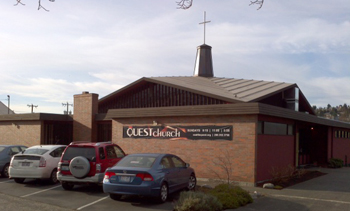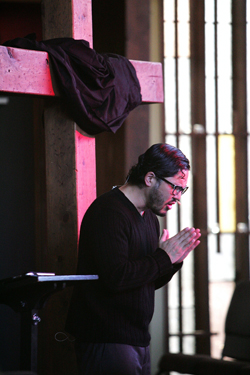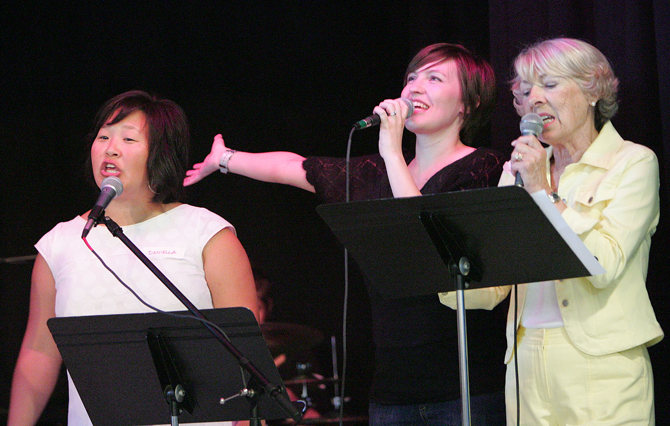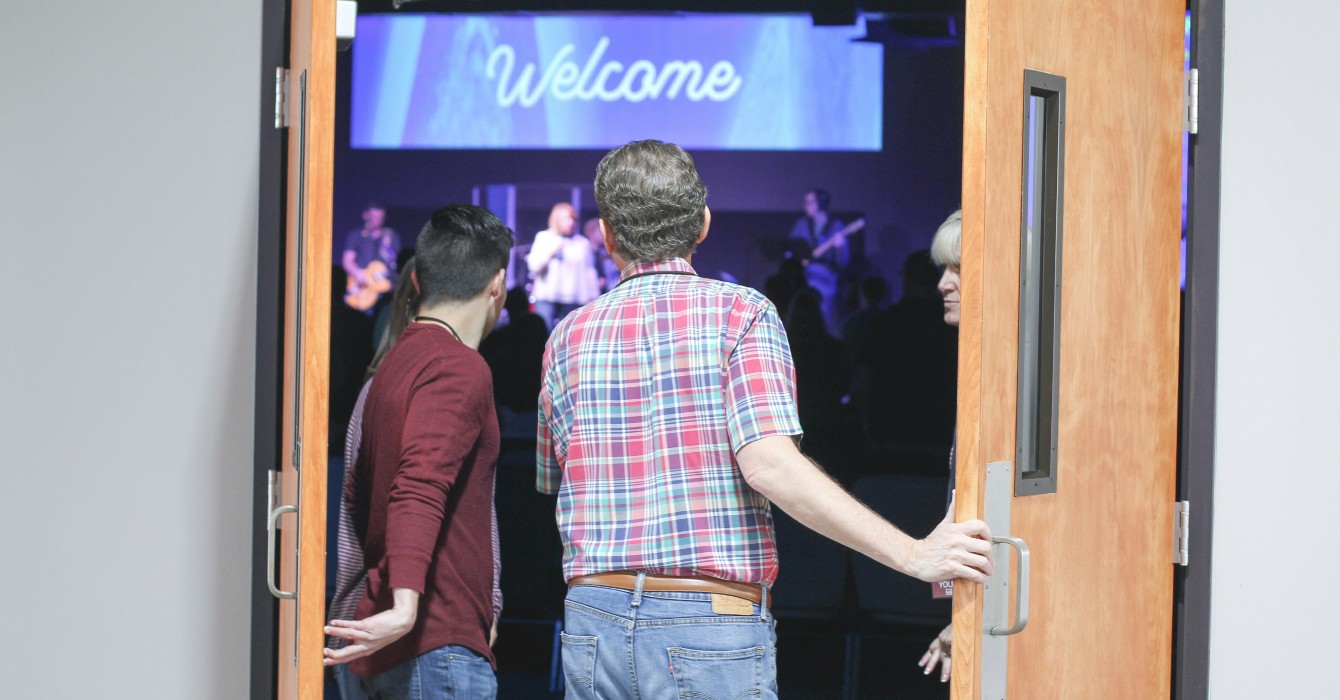Update: Eugene Cho resigned as lead pastor of Quest Church in June 2018; he serves as president and founder of One Day's Wages.
In 2007, Quest Church took over the property of Interbay Covenant Church in Seattle, absorbing 30 of its members and its staff. Interbay ceased to exist.
The process was surprisingly amicable, and the resulting church is stronger for it, said the Rev. Eugene Cho, who founded Quest in 2000.
 Cho also is the founder of the Q Café, a coffeeshop and music venue, and One Day’s Wages, an organization dedicated to raising money to alleviate extreme global poverty. He also is a blogger, speaker and author; his first book, “Overrated: Are we More in Love with the Idea of Changing the World, Than Actually Changing the World?” is set to release on Sept. 1.
Cho also is the founder of the Q Café, a coffeeshop and music venue, and One Day’s Wages, an organization dedicated to raising money to alleviate extreme global poverty. He also is a blogger, speaker and author; his first book, “Overrated: Are we More in Love with the Idea of Changing the World, Than Actually Changing the World?” is set to release on Sept. 1.
In this interview, Cho explains how this remarkable transformation took place, and why he largely credits the Rev. Ray Bartel, Interbay’s former pastor who now serves as one of Cho’s associate pastors. The following is an edited transcript.
Q: How did Quest Church develop the relationship you have today with the former Interbay Covenant Church?
You know, every now and then someone contacts me and they’ll say, “Hey, Eugene, how did you get a church to give you their land and assets and building?”
And for me, it just seems like a really distorted question, because it was never the intent when we began a relationship with this church -- nor is this, obviously, what you’re asking.
But I know, from some people’s perspective, that’s the most important question. And for us, it’s not the most important question; it was just something that happened organically as a result of building the relationship.

Church, which included a church building and a
warehouse space.
When we drove to this church the first time, I actually did not stop -- it was such the antithesis of what I wanted for a location for our church. Even though we were desperate, we didn’t stop, just drove by, because it was in a more industrial zone. And we were meeting in an area called the University District.
And when it got to a point where we were so desperate we needed a place in a week or so, we stopped by again and said hello to the pastor, Ray Bartel, who now happens to be one of my associate pastors, and had a friendly discussion.
He showed us the building, showed us the sanctuary, and it was nice, it didn’t surprise us in any way, but he did let us know that they also owned a warehouse, which was across the parking lot; it was a 4,500-square-foot space.
It was not occupied at that time; in fact, it had been recommended to be shut down by the fire marshals.
So we began our relationship with them as tenants. They were our landlords. To put it in much more Christian terms, we became neighbors, if you will -- colleagues partnering in ministry. And even though there weren’t a lot of things that we were doing together, I think it was a process of getting to know one another, which took place over the course of many years.
And during that time, the pastor, Ray, and I became good friends. We had meals together; we would share our burdens together. So that’s how it all began. Probably the most important thing is the authenticity of a relationship between two pastors, along with the church communities.
Q: The notion that you would go from being the church plant tenant to being the lead pastor, with Ray Bartel working as your associate, seems like such an unusual and generous transformation.
Yes, yes. Absolutely. I think that’s probably the most compelling aspect of this story. Ray Bartel was in his [late 50s] at that time. And he’s a second-career pastor -- worked at Boeing for some time. Has a couple of decades of ministry under his belt.
And to give you a little bit of the landscape of Interbay Covenant Church, they were about the average-size church in Seattle. They were about 70 people. They had no debt; they had this land and building, which isn’t huge, but it’s fairly valuable, because it’s located in the city of Seattle.
So they didn’t really have to do what they eventually chose to do. I think that’s the most important part, at least for me, of radical grace and generosity in this story.
But I think what was tugging at his heart, in addition to maybe some of their leaders, is that while they understood the importance of being missional, of engaging the culture, of doing ministry in today’s current context, they understood it theologically.
Pastor Ray has read the books; he understood. But I think he, along with the church especially, had a hard time translating that into application, into practicing it.
I think that’s what was a big struggle for him, as well as for the church.
A year later, through Interbay Covenant Church’s assistance, we were able to remodel the warehouse next door. And so we created our office spaces there, created a nonprofit cafe, community center, music venue, art space, and also used that space for our church gatherings on Sundays.
When we moved over to Interbay Church, we were initially about 30 people; 30 people became 60 people; 60 people became 120 people; one service became two services; two services became three services.
And they were not at all territorial. They weren’t at all insecure about it, but I think they began to ask what anybody would ask: “Why are they growing -- and why aren’t we growing?”
And I think that, again, speaks to Ray’s leadership. I think he had the courage to ask those questions, and I think some of those leaders also were asking those questions. And I think, as a result, we began to talk more about what that could look like. But it really stemmed from his maturity as a leader, his security in the gospel, and I think something about the larger vision of the kingdom.
When the conversation with Ray and I began to escalate after, I would say, a full year of a lot of prayer and discussion, he brought it up to his leadership team. They eventually had some discussions, and they voted on this merger.
“Merger” is what we called it, because we thought it was the most honorable, dignifying way of calling it. I’ve had some people look at it from their corporate lens and say it was a takeover, and it wasn’t a takeover, because it was all on their own initiation.
But when their leadership team voted on it initially, it was 9 to 1 against it. Ray was the only one that voted for it. So that’s a really important part of the story, because even though it makes sense and even though there were some who understood it in their minds, when it became closer to reality, it was really frightening.
So it’s important to share that when they first had their vote, it was 9 to 1 against it. And Ray made a promise to his leadership team that he would never bring this up again on his own accord, because he didn’t want to be that pastor that was somehow manipulating or shoving something down his team’s throat.
And I really respect him for that. I was discouraged that day when he told me the results of the vote, but that’s how it turned out.
And so for me, I started looking at other places, because we were at a point where we were now running three services and we needed a larger space. And so I had to be more active in looking for other spaces.
It was several months later that his leadership team came back to Ray and said, “OK, we’re now ready to talk about it.”
And I think the initial first wave of conversation was just so radical for them that they just had a hard time processing it. During that time, they said, “Well, if we merge and that would mean that Eugene would become our senior pastor, we’d like to get to know him better to see if that’s something that we would feel comfortable with.”

Church.
And as pastorally as I could, as gently as I could, I said to this person, “I know exactly what it will look like. It will look like Quest Church, as we are right now.”
And I think that was stunning for that person, because I think when you think of the word “merger,” the assumption is that this new thing would come about.
So I explained to this person that while it would look like Quest Church, I think about the legacy of their relationships, the legacy of their story, the legacy of all the gifts that they bring into our church. And about 30 of them actually joined our church after the merger officially took place. Our congregation at that point, including our children, was probably around 400 or so.
Their leadership team had another vote, and they voted 9 to 1 for the merger. And the one person, an amazing gentleman, who could not give his endorsement -- he was one of the church planters, one of the founding members of that church. He literally built the very foundation of that church, because he was in construction.
But they continued, and they joined our new church afterward, he and his wife.
Q: I get a sense that you brought something to that congregation, and obviously you were able to leverage the physical plant. What did that congregation bring to you that you didn’t have without them?
Our church was so young -- we have a bunch of 20-somethings, 30-somethings -- and one of the things that we were sorely lacking in was wisdom. You can’t fabricate time. So we have these folks that are older brothers and sisters in Christ who were in their 50s, 60s, 70s, 80s, 90s -- we had a couple of ladies hit their 100s before they passed away -- and came with so much. Not just faith and love for the gospel and their vision for the kingdom, but just so much wisdom, and their desire to love on these young people as well.
That was a huge answer to prayer, and it’s really hard to quantify the value of that to a church community like ours that was enthusiastic but lacking in experience, lacking in wisdom.
And I would just say that that would be the same with me as well. I was then probably around 35, 36 years old; I was 31 when I planted Quest Church. And while I have my share of experiences, it was always a great thing to have another pastor like Ray join our team, and with that comes his gifts and talents and also his wisdom and experience.
Q: Was Quest always an Evangelical Covenant church?
I was part of a mainline denomination some years ago. I did my theological studies at Princeton Theological Seminary, but at some point over the years, I had grown somewhat cynical about denominations and really about the larger organized religion conversation. So I kind of swore off denominations as a whole. When I planted Quest Church, it was nondenominational.
And as it started growing, a couple of things happened. One, people were asking, “Who are you with?” They didn’t care at first, but as we started growing, people started caring a little bit. And I didn’t have an answer, in terms of where our accountability came from.
The further we moved along the process, feeling like an island to ourselves became very apparent. And one of the themes of our church is that we’re never an island to ourselves. And I felt like we needed to live that out, even as a church plant.
Along the way, we began to speak with a denomination called the Evangelical Covenant Church. So when we were renting the space from Interbay, we became an official Covenant church.
So by the time that we had been in discussions of merging with Interbay, we were officially an Evangelical Covenant church, which made the process a little easier.
I distinctly remember one of their questions that -- it did sting a little bit, but it made sense to me -- the question they asked was, “Are you really a Covenant church?”
And I think the meaning behind that question is that, like all denominations, the world is changing. The Covenant denomination was started by Swedish immigrants in 1885 and was predominantly an outreach to Swedish immigrants -- families and communities.
They eventually learned that their vision for the kingdom and for ministry needed to expand, not just theologically, but also for its own survival. And so the Covenant is one of the more diverse denominations in the country right now.
And so they asked that question because we just did not look like a typical Covenant church. We were very diverse, with a young Asian leader, but by the time the merger took place, we were indeed a fully functioning Covenant church.
Q: So did their congregation actually dissolve?
They dissolved; that’s right.
We literally gave them blank sheets of paper and we said, “We want to honor you through this process. We want to make sure that your team is heard. We want to make sure that we can do all that we can to recognize the deep sacrifice and to honor your community.”
And so we asked them to write down everything that was important to them. That would be part of that commitment of seeing them and honoring them and recognizing them. And so they did.
Some of them included stuff like [the fact that] they wanted to merge their staff for at least one year, for us to assume relationship and support of all of their missionaries, to allow all of their members who wanted to continue to become members at Quest Church -- things of that nature.
They only had two staff; they had an administrator, and then they had Pastor Ray. And so we joyfully brought them onto our team, and Ray became one of several associate pastors at our church.
And we laugh about this -- I was just talking to him [about it] a couple of weeks ago over lunch -- we laugh about this, because his plan, which he had shared with me, was that he was intending to just stay on for one year and move on.
After that first year, he came to me, as well as my elder board, and he wanted to make sure (these are his words) that -- he didn’t want to feel like “dead weight.” You know, that we were not doing things for the sake of stroking his ego.
But he also decided that he no longer needed to receive a salary from the church, that he lives fairly simply, he and his wife, Joy. Joy still does our grounds; she takes care of the grass and the weeds and flowers. She doesn’t have to, but she remains committed to that.
And so he’s been a full-time associate pastor for the last seven years. The last six of those years, he’s not taken a salary, which has really enabled our church to make investments in other places, in other staff and other ministries.
So, again, it’s just an amazing -- the more I talk about it, I’m starting to get a little emotional. I respect that man, I love that man, and I really believe that when the time comes, he will truly sense God’s pleasure over his life.
Q: That is an amazing story. I mean, the lack of ego in that transition is pretty astounding.
It was not as easy as maybe it sounds. I think internally there were some things. All of us are committed to the team. We’ve got a team of 17 people on our staff, including a couple of pastors that are well-known on a national level.
What Ray would tell you is that it was a lot more difficult than he thought it was going to be. He knew it was going to be difficult. None of us are naive; we’ve been around the block a few times. [But] even though we’re team-oriented and kingdom-minded, we all have a sense of ego; we all have a sense of identity.
Q: I can imagine it probably was difficult for you, too; you could feel threatened by the former senior pastor.
I don’t know if I ever felt threatened. I think part of it, again, is just because of who he is. But I think both of us really understand what it means to be colleagues. I think both of us really understand the honor it is to be a minister of the word and sacrament. I don’t think either of us ever felt threatened.
I think the thing that I struggled with the most was that even though it looked like Quest Church, in terms of expression, in terms of its ministry, in terms of language, in terms of our worship, it was really trying to pastor well the whole church, including the 30 or so folk that chose to join Quest Church from Interbay.
There were times that I just really struggled: “Am I a good pastor? Am I doing this well?” We were navigating lots of changes, and growth possibilities as well.
We’re not a large church, but we’re currently about 800 people. There’s constant transitions and challenges that came our way, and I would just say it’s the insecurity of a pastor not knowing exactly how to navigate those waters; everything was a first-time experience, including planting a church.
Q: You were a very young, fresh, new way of doing church, and yet you took on a kind of history and tradition that you didn’t have before.
I had about 10 years of ministry experience prior to [Quest], in different contexts. You could read the books, you could read magazines and articles, you could do a lot of those things, and then the actual doing it is just an entirely different experience.
It reminds me of being a parent of three kids; you could read all the books and go to all the classes that hospitals offer, but it’s a different experience when you’re actually holding a kid at 2 o’clock in the morning.
And I’m so grateful, because the one distinction now, as opposed to the first year of the church plant, is not only were we significantly smaller -- we began with seven people -- [but] I was its only leader. And there were times it was very lonely. There’s a lot of self-doubting, self-deprecation as well.
[Now, I’m] in a position where I get to have a robust lay leadership on all levels of our church, to be able to journey with other women and men, people from different walks of life.
While we’re committed to the same trajectory, we also come with our unique gifts and skill sets and lenses by which we see things. This has been a profound impact, not just for the church, but a profound impact for my soul as a believer and as a leader in ministry.











